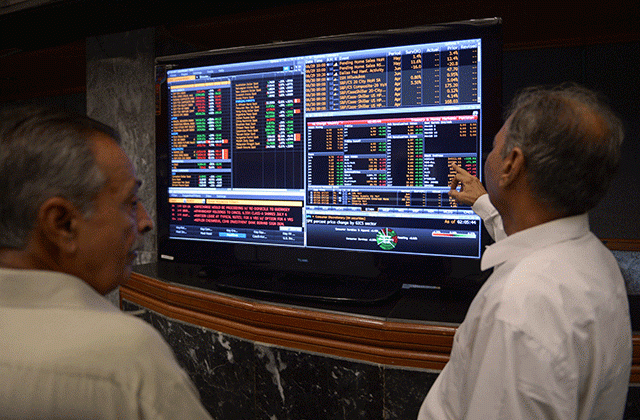A day after praising stock market, government changes tax regime for PSX investors
Experts believe KSE-100 is likely to come under pressure, albeit briefly

PHOTO: AFP
He announced imposing a flat capital gains tax (CGT) rate of 15% for filers, and a whopping 20% for non-filers of tax returns.
The policy is expected induce a negative reaction and the KSE-100 Index is likely to come under pressure when trading resumes on Monday.
PSX wants reduction in corporate tax, CGT
“The benchmark KSE-100 Index may open under pressure with a loss of around 1%,” said Topline Securities Chief Executive Officer Mohammed Sohail.
However, it is anticipated that the market will not prolong its stay in the negative territory and will recover in a couple of days.
“The euphoria linked with PSX upgrade into MSCI Emerging Market status will not let the market stay in the negative for long,” said Sohail.
On Friday, prior to the finance minister’s announcement, the benchmark index dropped 232.14 points or 0.44% to close at 52,636.87 points. The closing is slightly lower from the all-time high of 52,876.46 points recorded on Wednesday (May 24).
The 15% CGT rate has been proposed on stock purchased on or after July 1, 2013. Previously, the rate varied between 7.5%-15% depending on the holding period.
Another development besides this is that the government has doubled the rate of tax on dividend income from listed companies and mutual funds in the past two years.

In his budget speech, Dar announced that the “enhancement of tax rate on dividend - flat rate of 12.5% is proposed to be enhanced to 15% flat rate - while reduced rates of tax for certain types of dividend will remain unchanged”.
“Rates for dividend paid by mutual funds are also proposed to be enhanced from existing 10% to 12.5% in line with the increase on general dividend.”
Arif Habib Group Director Ahsan Mehanti said the continuation of super tax at 3% for private firms and 4% on banks, provided their income is over Rs500 million, was negative news for the investors.
However, allocation of over Rs2 trillion in the budget, including provinces’ development budget, would extend the much-needed support for the market. On the positive side, the government has announced to lower corporate tax rate to 30% from 31% as per plan. In addition, it has extended tax relief of 20% to newly-listed companies for another three years.
Sector-wise positive and negative impacts
Fertiliser: Sales tax on Di-ammonium phosphate (DAP) reduced to Rs100 from Rs400 is positive for the market. This may lead to improved consumption of fertilisers in the country. Besides, increment in agriculture loans on a reduced mark-up is also positive for the relevant stocks.
Cements: Federal excise duty (FED) increased by Rs12.5 per bag or 25% is negative. The manufacturers may not be able to pass-on the entire amount to consumers.
IT and Telecoms: Reduction in withholding tax rates on calls is a positive move. It may result in increase in volume of calls.
Automobiles: Reduction on withholding tax for filers on car purchase is positive. This may attract higher cars sales.
Steel: The increase in sales tax steel sector via FED on power is neutral for the sector, as the manufacturers are likely to pass-on it to end-consumers.
Asia’s best-performing market gives finance minister something to be proud of
Textile: Continuation of measures for one year of PM’s textile package announced earlier is neutral for the sector.
Oil Marketing: Reduction in taxes on sale of lubricants is neutral to positive. Some of this may be passed on.
Tobacco: Increase in FED by Rs4/pack or 10% is negative. Rates of taxes for non-filers which are to be increased across the board are neutral for the markets.
Published in The Express Tribune, May 27th, 2017.
Like Business on Facebook, follow @TribuneBiz on Twitter to stay informed and join in the conversation.


















COMMENTS
Comments are moderated and generally will be posted if they are on-topic and not abusive.
For more information, please see our Comments FAQ